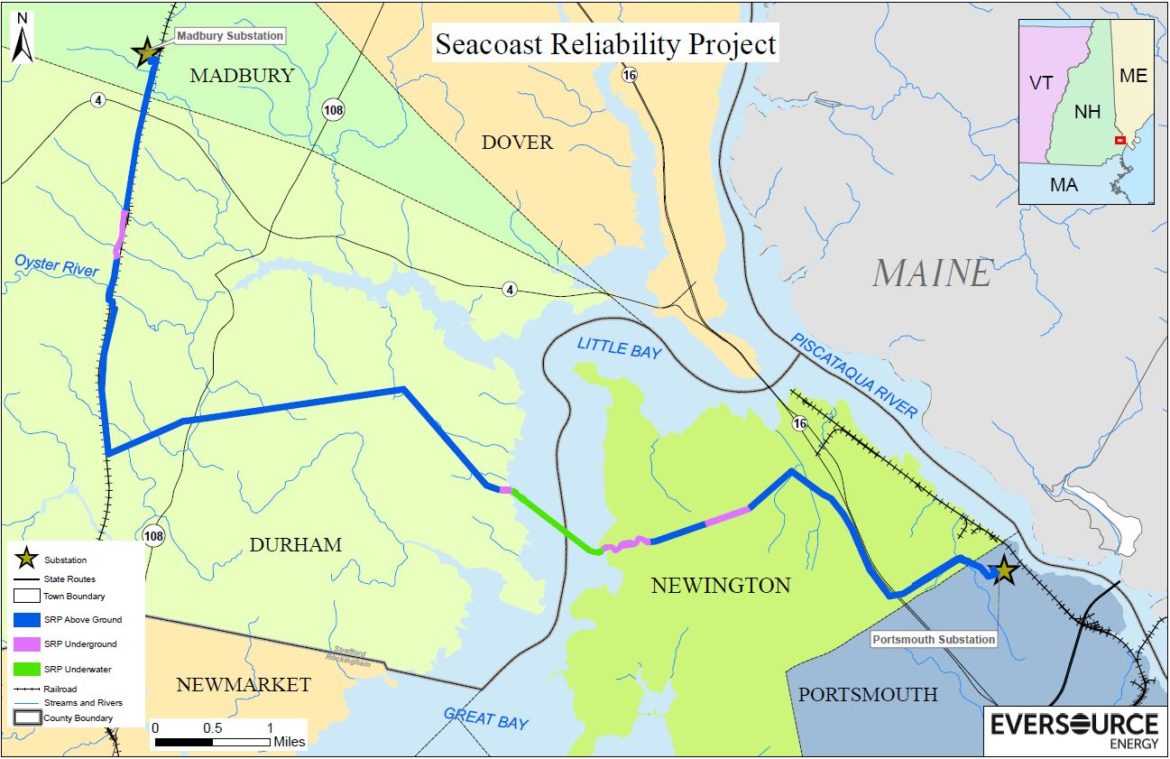By GARRY RAYNO, InDepthNH.org
CONCORD — The Conservation Law Foundation filed an appeal with the state Supreme Court Monday challenging approval of the Seacoast Reliability Project.
The Site Evaluation Committee approved the $84 million, 13-mile transmission line from Madbury to Portsmouth in December and issued a written order in January.
Last month state regulators rejected a rehearing request by the Conservation Law Foundation, the Town of Durham and a Durham residents’ group which allowed opponents to appeal the decision to the Supreme Court.
The CLF’s appeal centers on concrete mattresses that will be placed over the three cables to be buried under Little Bay near the shores of Newington and Durham.
The mattresses, which will be exposed at low-tide, will be placed over the transmission lines where they cannot be buried under 42 inches of soil.
The law foundation claims the mattresses require approval of the Governor and Executive Council because they impact the public’s use of public waters held in trust by the state.
But the SEC ruled twice the mattresses did not require Governor and Council approval because the public land was not being leased and would not be permanent.
“There is no dispute that Little Bay and its tidally submerged lands are public trust resources, pursuant to the New Hampshire’s public trust doctrine, are held by the state in trust for the benefit of the public,” writes attorney Tom Irwin, vice president and director of CLF New Hampshire.
“It is also undisputed that there are numerous public uses of Little Bay, including the project area, that are protected under the public trust doctrine. Such uses include boating, fishing, and recreational and aesthetic enjoyment” that would be impacted by the concrete structures.
The SEC’s decision cited a Public Utilities Commission order allowing utilities to cross public waters including Little Bay and argued the concrete mattresses would not be permanent and not amount to a disposal or leasing of state-owned property.
In the SEC’s denial of a rehearing, it stated that utility use is “one of the legal uses authorized by the Legislature.”
Irwin contends in his appeal that the SEC’s determinations are unlawful and unreasonable for several reasons.
The decision “fails to address and make accommodation for the state’s important role as trust of Little Bay and its subtidal lands for the benefit of the public,” Irwin writes.
“In the first instance, the Subcommittee exceeded its authority in determining Applicant’s property rights for purposes of installing concrete mattresses in Little Bay and in rendering a determination that the installation of concrete mattresses would not violate the pubic trust doctrine by substantially impairing public uses.”
He notes the Legislature has not granted the SEC the authority to adjudicate and determine property rights, nor the authority to make public trust determinations.
“The Subcommittee’s decision, and the issues raised in this appeal, raise important considerations that are necessary to protect the public’s interest in public waters and tidally submerged lands, and to ensure the state fulfills its fiduciary role as trustee of such resources for the public’s benefit,” Irwin writes.
The Supreme Court will first have to decide if it will accept the appeal, but usually that is a formality for SEC decisions.
The CLF had until Monday to file the appeal.
While Eversource expects to move forward with the project, the Army Corps of Engineers announced last month the Seacoast Reliability Project will have significant impacts on federal waters, wetlands and fish habitat along and in Little Bay.
As a result the Army Corps will require a site specific “individual” permit rather than a “general” permit which would have left the bulk of the work to the state Department of Environmental Services.
Although the issue is not raised in the CLF appeal, the use of the jet plow and hand jetting methods have been hotly debated after many towns around Little and Great Bays spent considerable money reducing the amount of nitrogen going into the waters of the two bays.
The project still needs federal approval by the Army Corps of Engineers for a wetlands permit and work in federal waters.
In making its decision to issue a permit for the reliability project — paid for by ratepayers across New England — the seven-member committee determined Eversource had met all four criteria laid out in law to grant a certificate to build the 115 kilovolt, high-voltage transmission line.
The four criteria are: that Eversource has adequate financial, technical, and managerial capability to build and run the project; the project will not unduly interfere with the orderly development of the region; the project will not have an unreasonable adverse effect on aesthetics, historic sites, air and water quality, public health and safety, and the project is in the public’s interest.
On Wednesday, the Supreme Court will hear oral arguments on the SEC’s decision to deny Eversource’s application for the Northern Pass Transmission project running 192 miles from the Canadian border to Deerfield.
The SEC found Eversource had not met the legal requirements needed to prove it would not unduly interfere with the orderly development of the region.
The nearly 1,090 megawatt, $1.6 billion, high-voltage project would have carried Hydro-Quebec electricity to Massachusetts, but that power is now expected to travel through Maine on a similar transmission line that has won some state backing, but still needs other state and federal permits.
Garry Rayno may be reached at garry.rayno@yahoo.com





